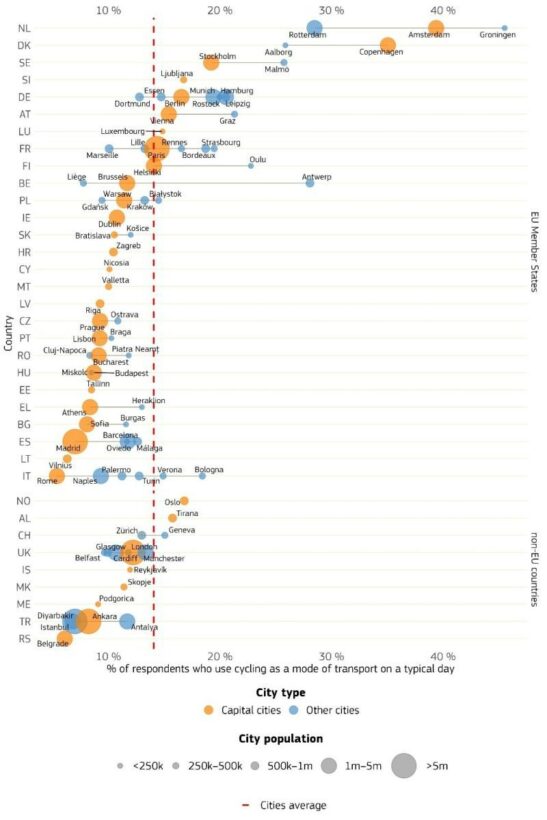Cycling tourism is flourishing, with an increasing number of travelers adopting cycling during their holidays. This rise is attributed to environmental awareness, electric bicycles, and improved infrastructure.
Cycling tourism flourishes, with more travelers embracing cycling during their holidays
Cycling tourism is flourishing, with an increasing number of travelers adopting cycling during their holidays. This rise is attributed to environmental awareness, electric bicycles, and improved infrastructure.

Cycling tourism is on the rise, with an increasing number of travelers adopting cycling during their vacations. This growth is attributed to environmental consciousness, electric bicycles, and improved infrastructure.
Emerging tourism trends reveal a growing interest and demand for cycling tourism, both for environmentally friendly daily commutes in many European cities and for vacations that combine cycling excursions, bike routes, and full cycling activities. Simultaneously, there is an increase in travel agencies selling cycling routes, and cycling is becoming more frequently presented at tourism exhibitions.
The cycling tourism industry in Europe is undergoing significant changes, adapting to new trends and the demands of both experienced cyclists and newcomers to the activity. In European countries, particularly those that are major sources of tourist clientele for Greece, there is a significant increase in citizens who engage in cycling and those who choose to combine it with their vacations.
Let’s take a look at the latest trends in cycling tourism in Europe, the role of the EuroVelo network, and a case study on the “Bike Friendly” Certification in Greece.
In the latest trends in cycling tourism in Europe, there is a rise in demand and the number of participants. In 14 European countries, there is an official “National Strategy for Cycling,” in another 7 countries, there is a similar strategy that covers it, and in 8 countries, the strategy is under development, including Greece.
In a special survey by the European Commission on the quality of life in European cities (“Quality of life in European cities” report, December 2023), an increase in bicycle usage was observed. Overall, an average of 14% of respondents said they use bicycles for daily commutes, but in some cities, the percentage exceeded 30% (see the chart below).

Cycling tourism is experiencing a new boom. At a special conference on cycling tourism in October 2023, in the framework of the World Tourism Organization (UNWTO) cooperation, the Director for Europe of the UNWTO, Ms. Alessandra Priante, noted, among other things: “Cycling tourism is growing at an unprecedented rate and promotes sustainability like no other form of tourism. There is a growing tourist trend with ecological awareness, especially among young people…”.
In Germany, popular routes such as the Elbe Cycle Route, the Baltic Sea Coast, and the Danube Cycle Route are part of the extensive EuroVelo network. At the Bike Forum Conference (November 2023 at the PHILOXENIA Exhibition in Thessaloniki), the marketing manager of the German Cyclists’ Association stated that the average age of German cyclists is 52 years.
In Italy and Spain, infrastructure for cycling use (routes and bike paths) is particularly developed. In Italy, in particular, there is a significant increase in “pure” cycling tourists, reaching 9 million, thanks to the country’s rich natural beauty and outdoor experiences, according to EuroVelo research.
In France, 22 million French people say they cycle during their holidays, and France ranks as the second global cycling tourism destination after Germany.
In Greece, the Attica Region is already developing cycling routes in the coastal area of the “Athenian Riviera,” while the redevelopment of the former Royal Estate in Tatoi includes plans for cycling trails.
At the same time, globally, there is an increasing popularity of electric bicycles. Electric bikes (e-bikes) are now a key element in cycling tourism, attracting a broader audience, making cycling more accessible, easier, and correspondingly a more popular activity. Electric bikes are particularly loved because they help cyclists cover longer distances and tackle difficult terrains, making areas that were previously almost inaccessible, accessible, says the CBI EU research. All ages have cycling enthusiasts. Indicatively, in the United Kingdom, 65% of electric bikes are bought by people aged 55 and over.
The sustainability and ecological aspect is a significant attraction in cycling tourism. Cycling offers an environmentally friendly way of exploring, while infrastructure is gradually evolving to support it, and the EuroVelo route network now plays a crucial role in promoting sustainable tourism (EuroVelo research).
The cycling tourism customer has a broad range of interests and corresponding various cycling experiences. Cycling tourism in Europe caters to a wide range of interests and skill levels, from mountain bikers seeking challenging routes to leisure cyclists exploring the beauty of the continent with electric bikes (CBI EU).
2023 is a landmark year for the development of cycling tourism and the support of bicycle use, as the European Parliament issued a Resolution on the development of an EU strategy for cycling (B9‑0102/2023) and proposed designating 2024 as the “Year of Cycling for Europe.”
The Role of EuroVelo
The EuroVelo network is at the heart of these developments, aiming to expand and improve cycling infrastructure across Europe. With 64% of the network ready for use by 2021, ongoing efforts are being made to complete it and enhance connectivity with national and regional cycle networks. The EuroVelo Certification Standard aims to ensure high-quality infrastructure and services along these routes (EuroVelo).
Case Study: The Bike Friendly Certification in Greece
The Bike Friendly label in Greece is a characteristic example of how countries are adapting to the growing interest in cycling tourism. The Bike Friendly initiative, which has been in operation for more than 7 years, recognizes accommodations and services that specifically address the needs of cycling visitors – tourists, offering secure parking, maintenance areas, personalized services, and generally supporting the cyclist-tourist. The Bike Friendly Network’s efforts are part of a broader strategy to make Greece a top destination for cycling enthusiasts, leveraging the diverse landscapes and rich cultural heritage, the varied geomorphology that can satisfy different choices of cycling tourists, and supporting the development of destinations to attract cycling tourists.
Conclusions
Cycling tourism in Europe is thriving, with more and more travelers seeking cycling experiences as part of their holidays. The expansion of the EuroVelo network and initiatives like the Bike Friendly label in Greece underscore the ongoing efforts to serve this growing market. Whether through the use of electric bicycles, the push for sustainability, or the provision of bike-friendly services, Europe is poised to remain a top destination for cycling tourists.
[1] European Commission DG REGIO, Report on the Quality of Life in European Cities 2023 – The survey included over 70,000 European citizens from 83 cities in the EU, the United Kingdom, Norway, Switzerland, the Western Balkan countries, and Turkey, covering many aspects related to quality of life in a city, such as housing, income, culture, green spaces, healthcare, the quality of public administration, and mobility.
[3] https://www.europarl.europa.eu/doceo/document/B-9-2023-0102_EN.html
[4] Collaboration between NatTour AMKE and the Hellenic Society for the Protection of Nature



